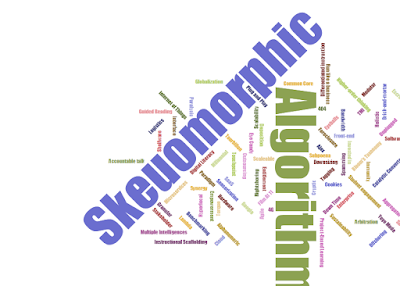 |
| Apparently it is difficult to make a word-cloud, so there you go |
A terminology, therefore, ideally makes a writing or report
more concise. On the other hand, it does not seem fair to justify the use of
jargons for a piece of writing or statements addressed to public. The main
reason is that some terminologies only apply and are useful for specific group
of people.
When doctors start to use medical terminologies that their patients
have never heard before, it would make the explanation quite ambiguous attached
with an uncertain nature. Patients are not doctors, so both of them must share “common
language” in order to communicate effectively and come up with understandable
solution for the patients’ underlying health condition. The same thing can be
said to many other branches of knowledge that we often encounter in everyday
life for examples electricity, computers, trades, legal issues, biology,
physics, carpentry, and so on.
One of the most acceptable exceptions is in school hours.
Students hear many new jargons, or at least those that the students think are
new, on daily basis. Biggest difference is that the teachers – in this case the
speakers – are bound by professional obligation to explain the meaning of the
terminologies to their pupils. As a matter of fact, teachers can spend many
hours to help students understand a single terminology alone. The purpose is to
get rid of confusions among students anytime the same jargon is used again
under different subject both inside and outside of school environments.
During conversational situation, however, jargons are rarely
described by the speakers under the assumptions that the listeners understand
the subject as well. It only makes sense in case the conversation happens among
people of the same academic group for examples when physicians discuss atomic
structure with other physicians or people of relating fields of study. Assuming
the discussion happen between an educated scientist and a young student, there
is very good chance that the student is left in the dark. As a result, the
discussion has no apparent answer to questions.
Terminology is a science in itself with the sole purpose of
studying terms. Human is very good at it. Our ancestors came up with new word
to describe things that we all agree to use now. Let me give you one example:
There is no clear reason why a table is called a table. What
we now understand is that it is some kind of platform on which we put down some
things such as a pencil, a phone, an ashtray, candles, and all other things so
you can have easy access to them. We also agree, at least in our mind, that a
table has a flat surface, four legs, and it must be sturdy enough to support
the weights of many things on it. As design and creativity develops, you can
actually make a table with only three legs or make the surface rather rough
too. As long as it looks like a table and serves the function of a table, no
one will blame you for calling it simply as “a table”.
People grow smarter and things become more complicated to
explain; soon enough, your daily conversation will be sprinkled with too many
jargons that long ago would not be understandable. As people are becoming more
familiar with every new terminology, communication also becomes easier,
hopefully.